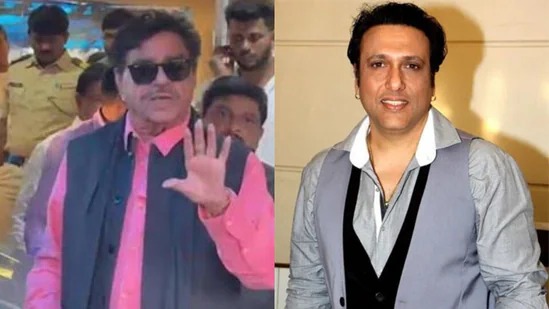In the world of Bollywood, where glamour and intrigue coexist, the lives of actors often attract a myriad of rumors and conspiracy theories. One such narrative that has recently resurfaced involves veteran actor Govinda and the circumstances surrounding a gunshot injury he sustained years ago. This incident, shrouded in speculation and hearsay, has caught the attention of Shatrughan Sinha, another illustrious figure from the film industry. In a candid discussion, Sinha addressed these conspiracy theories head-on, asserting unequivocally that “there are no ifs and buts” regarding the truth behind Govinda’s injury. The incident in question dates back to the late 1990s when Govinda was at the height of his career. The versatile actor, known for his impeccable comic timing and dance moves, was involved in a shooting accident that led to a gunshot wound. The nature of the injury sparked immediate media frenzy, leading to a flood of speculation about its origin. Rumors ranged from an accidental discharge during a film shoot to more sensational theories involving rivalries and personal feuds within the industry. As time passed, the details of the incident became clouded by various narratives, with some fans and critics insisting that there was more to the story than met the eye. This curiosity was exacerbated by the lack of clarity in the initial reports and the subsequent silence of those directly involved, including Govinda himself. While the actor continued to work and thrive in his career, the incident lingered in public discourse, serving as a fertile ground for conspiracy theorists. Enter Shatrughan Sinha, a stalwart of Indian cinema known for his candidness and strong opinions. With a career spanning several decades, Sinha has been an integral part of Bollywood, establishing himself not only as an actor but also as a politician. His perspective carries weight, and when he chose to speak on the matter, it was met with considerable interest. In a recent interview, Sinha firmly dismissed the various conspiracy theories surrounding Govinda’s gunshot injury. He emphasized that, despite the rampant speculation, the truth of the matter is far more straightforward than what many have suggested. “There are no ifs and buts,” he stated, underscoring the need for clarity and truth in the face of rampant rumors. Sinha’s assertive stance serves as a critical reminder of the responsibility that public figures have in shaping narratives. By addressing the issue head-on, he not only defended Govinda but also challenged the media and the public to refrain from sensationalism without evidence. His comments resonate in an era where misinformation can spread rapidly, often causing irreparable damage to reputations and personal lives. The allure of conspiracy theories lies in their complexity and the excitement they generate. In the case of Govinda’s injury, the theories often suggested motives that ranged from personal betrayal to industry rivalry. Some speculated that the injury was a result of a calculated act against Govinda, driven by jealousy or professional envy. Others pointed to the possibility of a cover-up, suggesting that the truth was being deliberately obscured to protect certain individuals or interests within the film industry. However, Sinha’s remarks cut through this complexity, reminding everyone that such narratives often lack solid foundations. The most prevalent theory—that Govinda had enemies in the industry who would resort to violence—bears little evidence. Such claims often thrive in the absence of information, feeding on the public’s appetite for drama and scandal.
‘There are no ifs and buts’: Shatrughan Sinha puts to rest conspiracy theories around Govinda’s gunshot injury

